If you’re wondering whether drinking coconut water is worthwhile, the answer is yes, it can support key areas of nutrition and wellness. Coconut water is rich in electrolytes like potassium and magnesium, low in fat, and may help with hydration, heart-health support, blood-sugar balance and more. Understanding its nutritional profile, uses, benefits, and precautions is important so you can make informed choices, especially if you have specific health goals or conditions.
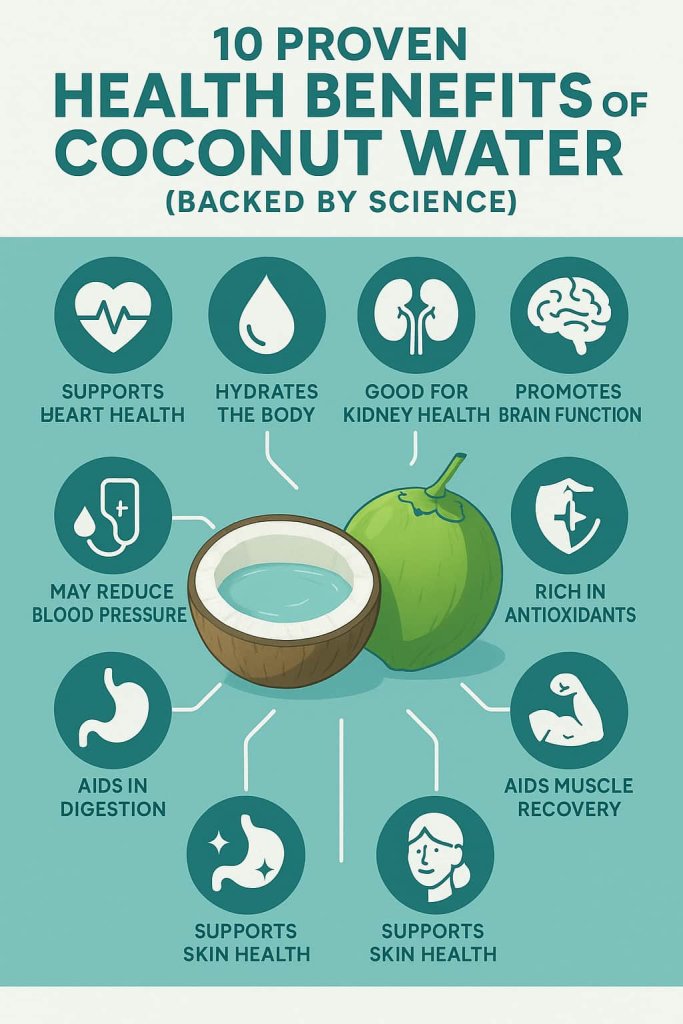
In this article on benefits of coconut water, we’ll walk through what the science currently shows, how you can incorporate it into your diet, precautions or limitations, and answer common questions.
What Is Coconut Water? (Overview and Nutrition Profile)
Coconut water is the clear, refreshing liquid found inside young green coconuts—usually harvested when the fruit is about six to seven months old. It serves as the nutrient fluid that nourishes the developing coconut and is often referred to as nature’s electrolyte drink.
Unlike coconut milk, which is made by blending the grated flesh of mature coconuts with water and is high in fat, coconut water is low in calories, virtually fat-free, and composed mostly of water (about 95%), along with small amounts of natural sugars, vitamins, and minerals.
According to the Cleveland Clinic, coconut water supports hydration and helps restore essential electrolytes such as potassium, magnesium, and sodium—nutrients vital for muscle, nerve, and heart function. Data from the USDA FoodData Central confirms that it is a naturally nutrient-dense beverage, offering gentle hydration with fewer calories and sugars than most commercial fruit juices or soft drinks.
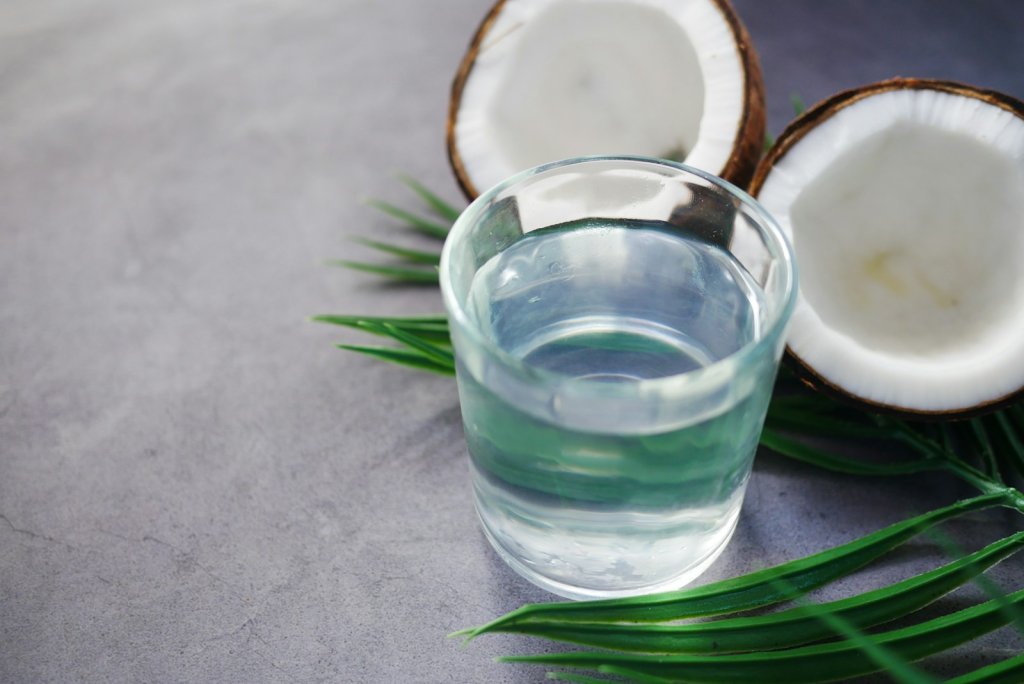
Nutritional Profile of Coconut Water (Per 1 Cup / 240 mL)
| Nutrient | Approx. Amount | Primary Function / Benefit |
|---|---|---|
| Calories | 45–60 kcal | Provides light, natural energy for daily hydration |
| Carbohydrates (Natural Sugars) | 11–15 g | Supplies quick energy through natural glucose and fructose |
| Protein | 0.2–0.5 g | Offers trace amino acids for tissue support |
| Total Fat | 0 g | Naturally fat-free and cholesterol-free |
| Potassium | 470–509 mg (≈15% DV) | Helps maintain normal blood pressure and muscle function |
| Sodium | 30–45 mg | Supports electrolyte balance and nerve transmission |
| Magnesium | 15–20 mg (≈5% DV) | Aids muscle relaxation and energy metabolism |
| Calcium | 40–50 mg | Contributes to bone and heart health |
| Vitamin C | 2–4 mg | Acts as a mild antioxidant, supporting immune and skin health |
Key Takeaways:
- Naturally hydrating: Rich in electrolytes like potassium and magnesium that support hydration and muscle balance.
- Low-calorie beverage: Around 45–60 calories per cup—lower than fruit juices or sodas.
- Fat-free and cholesterol-free: Suitable for heart-conscious diets.
- Distinct from coconut milk: Coconut water is light and hydrating, while coconut milk is rich, creamy, and high in saturated fat.
10 Proven Health Benefits of Coconut Water (Backed by Science)
Coconut water is more than just a tropical refreshment — it’s a nutrient-rich beverage that may support hydration, heart health, and overall wellness. Below are ten evidence-based benefits supported by current scientific research and expert health organizations.
1. Supports Hydration
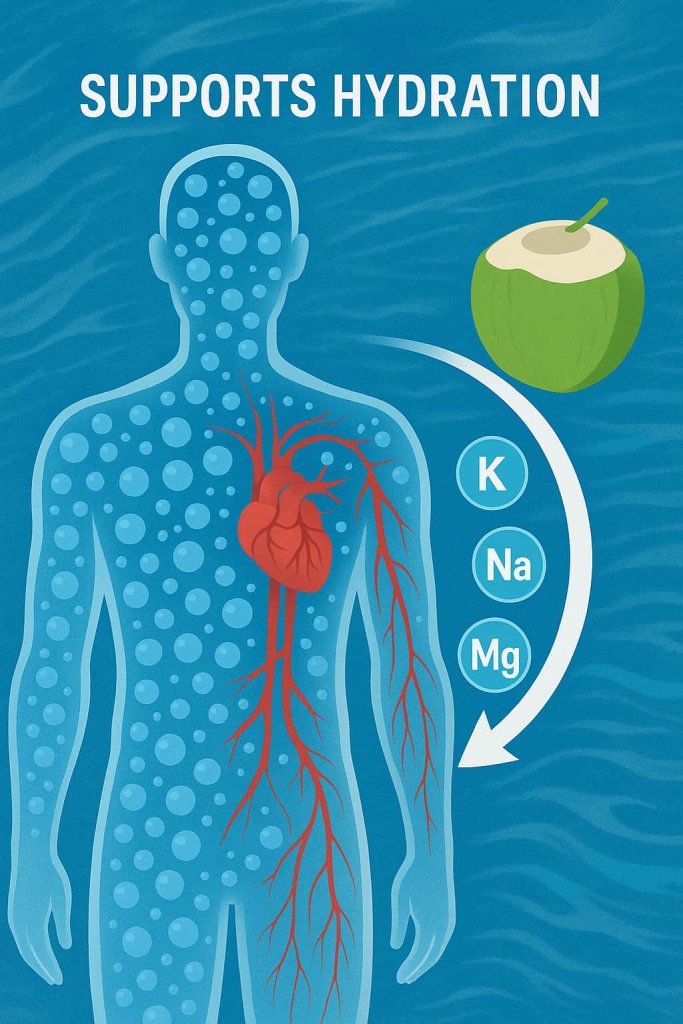
Coconut water contains essential electrolytes—mainly potassium, magnesium, and sodium—that help maintain the body’s fluid balance after sweating or mild dehydration.
According to the Mayo Clinic, coconut water is suitable for light hydration and can replenish electrolytes after exercise or heat exposure. However, plain water remains the best daily hydration choice for most people.
For enhanced balance, moderate coconut water intake (1 cup) after physical activity can be beneficial as part of an overall hydration strategy.
2. Rich in Potassium for Heart Health

Each cup of coconut water provides around 470–500 mg of potassium, a mineral essential for maintaining normal heart rhythm, nerve function, and muscle contraction.
The Harvard T.H. Chan School of Public Health highlights that potassium intake helps counteract sodium’s impact on blood pressure, promoting cardiovascular wellness.
By regularly choosing potassium-rich foods like coconut water, fruits, and vegetables, you may support healthier blood pressure and fluid regulation throughout the day.
3. May Support Healthy Blood Pressure

Preliminary human studies suggest that coconut water may help lower systolic blood pressure in people with mild hypertension due to its combination of potassium and magnesium.
A review published by the Cleveland Clinic notes that these minerals play a supportive role in maintaining healthy blood pressure levels and vascular function.
While promising, these effects should complement—not replace—medical care or prescribed treatments.
4. A Low-Calorie Alternative to Sugary Drinks
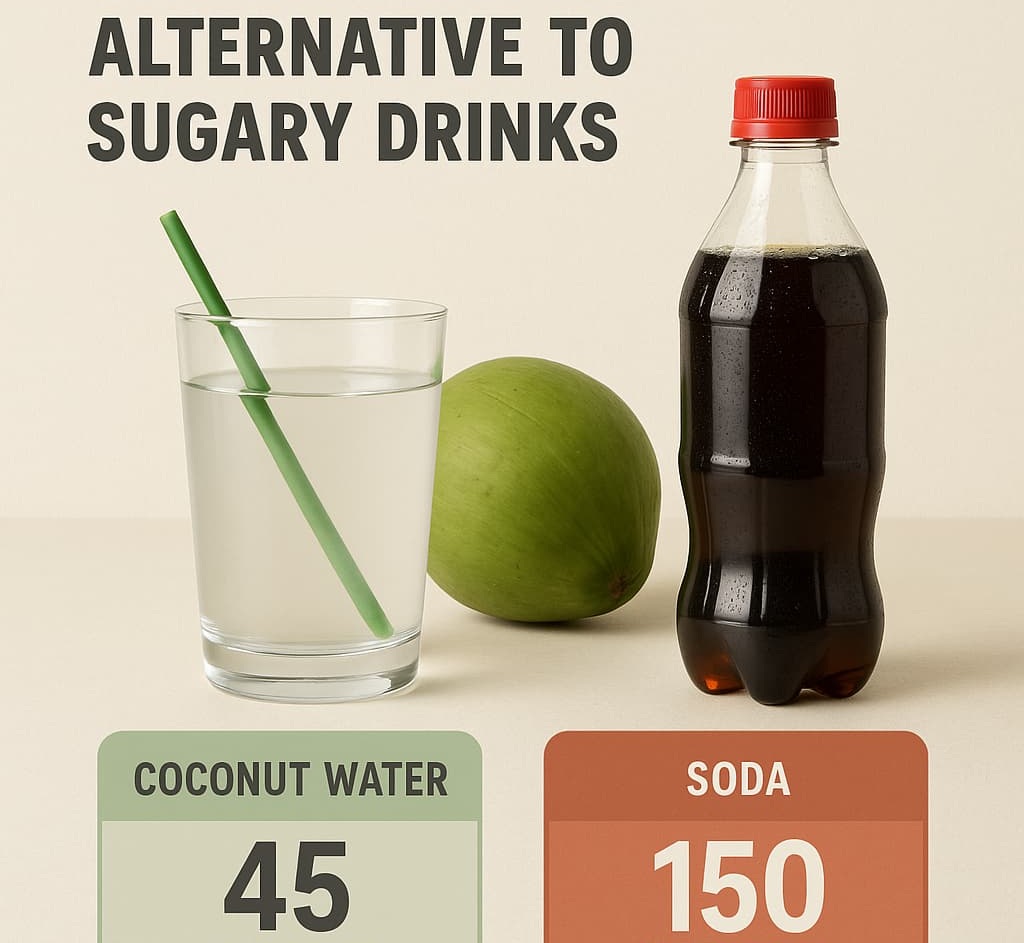
Coconut water naturally contains fewer calories and sugars than soft drinks or fruit juices, typically providing 45–60 calories per cup.
The Cleveland Clinic and WebMD both recommend unsweetened coconut water as a better hydration choice for those reducing added sugar intake.
It’s also cholesterol-free and virtually fat-free, making it a refreshing way to stay hydrated without unnecessary calories.
5. May Aid Post-Exercise Recovery

Coconut water provides hydration and electrolytes that can help replenish fluids after moderate physical activity.
A 2024 review in Frontiers in Nutrition found that coconut water rehydrates as effectively as certain sports drinks for light to moderate exercise sessions, thanks to its natural potassium and carbohydrate content.
However, because its sodium content is lower, endurance athletes may still require higher-sodium fluids for optimal recovery (Frontiers in Nutrition, 2024).
6. May Help Support Blood-Sugar Balance
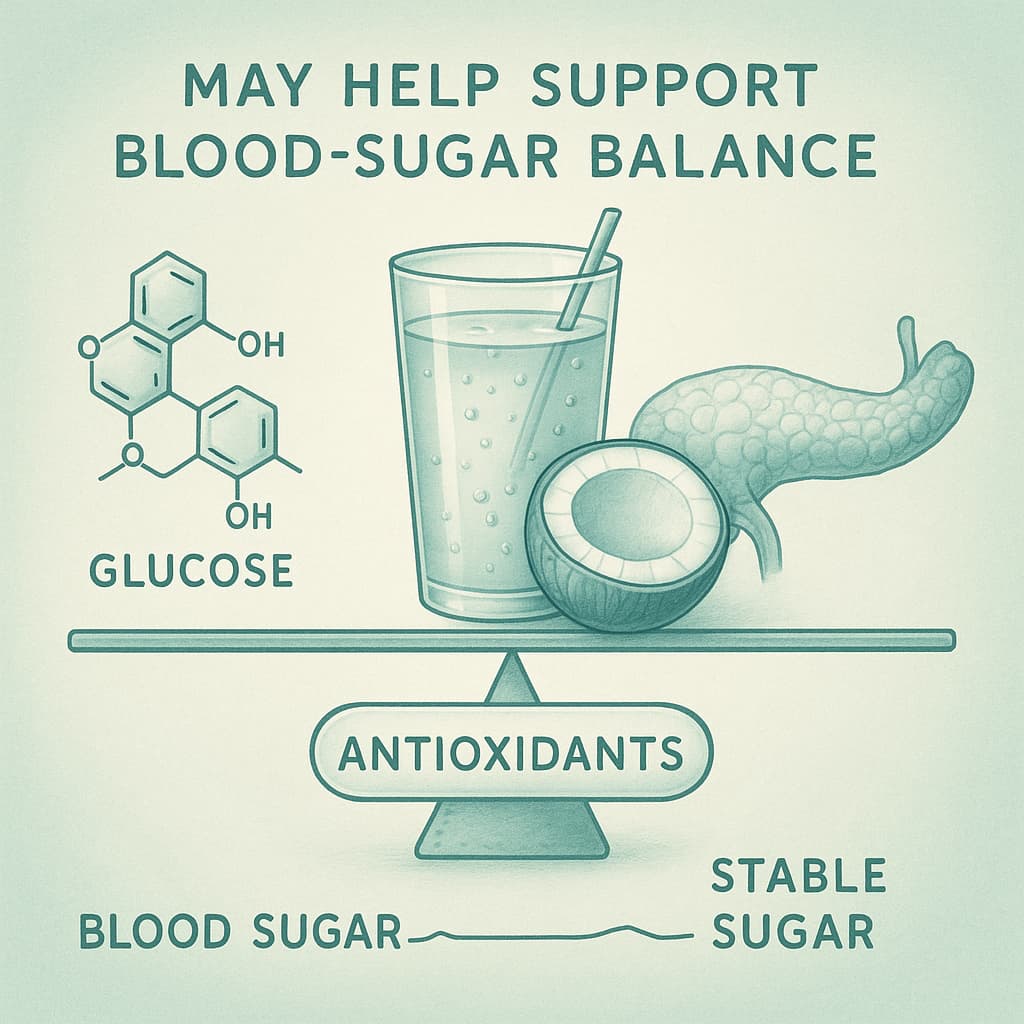
Emerging research suggests that coconut water may support blood-sugar control by improving insulin sensitivity and glucose metabolism.
Animal studies have shown that coconut water polyphenols may help reduce oxidative stress and maintain better glycemic balance (Medical News Today).
Human data are still limited, so individuals with diabetes should monitor blood glucose levels and consume coconut water in moderation.
7. May Reduce Kidney-Stone Risk

Early findings suggest that coconut water may support urinary health by increasing urinary citrate and potassium—compounds known to discourage crystal formation in the kidneys.
According to the Cleveland Clinic, maintaining adequate hydration is the best way to reduce the risk of kidney stones, and coconut water can be one component of that strategy.
While promising, it should complement—not replace—hydration through plain water and a balanced diet.
8. Provides Antioxidant Support
Coconut water contains small but meaningful amounts of vitamin C, phenolic acids, and cytokinins—natural compounds that act as antioxidants.
Research summarized by Healthline notes that these compounds help neutralize free radicals, thereby supporting cellular defense systems and reducing oxidative stress.
Though the antioxidant capacity is modest, coconut water contributes to your daily intake when paired with a diet rich in fruits and vegetables.
9. May Promote Skin Hydration and Radiance

Proper hydration is key for skin elasticity and moisture balance. Coconut water, rich in electrolytes and antioxidants, may help maintain internal hydration that reflects outwardly on the skin.
According to dermatology experts at the Cleveland Clinic, the beverage supports overall hydration, which benefits the skin indirectly.
For best results, combine coconut water with a balanced diet, sufficient sleep, and proper skincare.
10. Supports General Well-Being

Coconut water’s combination of minerals, mild sweetness, and refreshing taste encourages better hydration habits.
Replacing sugary drinks with coconut water may help support energy balance, hydration, and cardiovascular health.
The National Institutes of Health (NIH) underscores the importance of potassium and magnesium in maintaining nerve and muscle function, both of which are present in coconut water.
Overall, it’s a simple, nutrient-rich beverage that supports everyday wellness when consumed sensibly as part of a balanced diet.
How to Incorporate Coconut Water into Your Diet
Coconut water is easy to include in your daily routine as a hydrating and nutrient-rich beverage. It fits well in most balanced diets when consumed in moderation and paired with wholesome foods.
Recommended Daily Serving
For healthy adults, 1–2 cups (about 240–480 mL) per day is a reasonable amount. This provides electrolytes and mild energy without excess sugar or calories. If you’re watching blood sugar or calories, limit to 1 cup daily.
Best Times to Drink
- After exercise: Coconut water supports fluid and electrolyte replenishment after moderate physical activity.
- Morning hydration: Drinking it first thing in the morning can help restore hydration after overnight fasting.
- In hot weather: Ideal for replenishing fluids and minerals lost through sweating.
Choosing the Right Type
- Always choose 100 % pure, unsweetened coconut water.
- Check labels and avoid varieties with added sugar, flavours, or preservatives.
- When available, fresh coconut water offers the most natural nutrient balance.
Smart Pairings for Balanced Nutrition
- Blend into smoothies with fruits and leafy greens for added vitamins.
- Use as a base for post-workout shakes with protein powder or Greek yogurt.
- Combine with whole foods like bananas, chia seeds, or oats to create balanced, electrolyte-rich snacks.
Possible Side Effects and Precautions
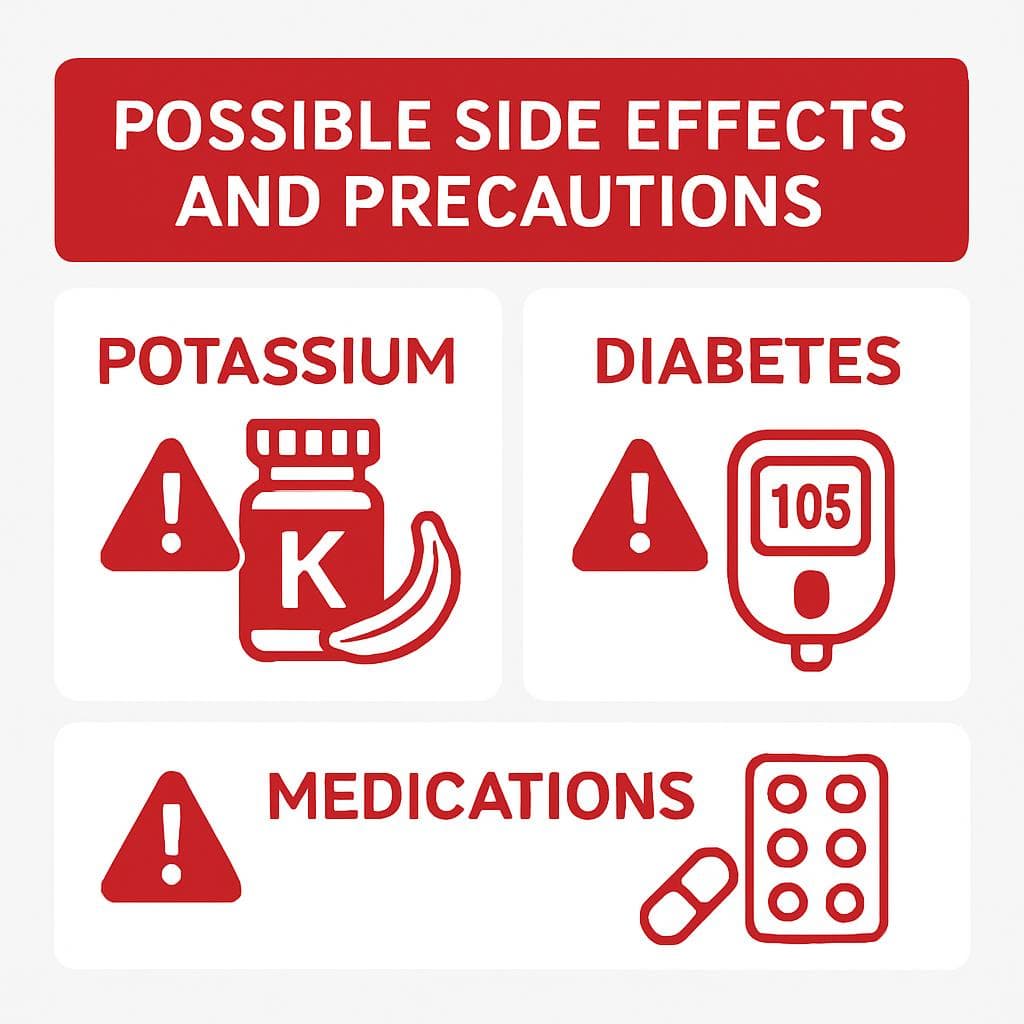
While coconut water is safe for most people, a few health considerations should be noted to maintain safety and accuracy.
1. High Potassium Caution
Coconut water is naturally high in potassium. Individuals with kidney disease or those taking potassium-sparing medications should avoid excessive intake. The Mayo Clinic notes that excessive potassium can be harmful for people with reduced kidney function, as the body cannot excrete it efficiently.
2. Sugar Content for Diabetes
Even though it contains natural sugars, coconut water may raise blood glucose if consumed in large quantities. People with diabetes or insulin resistance should monitor portions and consult a dietitian for safe inclusion.
3. Low Sodium for Endurance Athletes
Coconut water has lower sodium than typical sports drinks. Athletes engaging in intense or prolonged exercise may need beverages with higher sodium levels to replace salt losses and prevent hyponatremia.
4. Medication Interactions
People taking ACE inhibitors, diuretics, or heart medications should speak to their healthcare provider before regular consumption. The NIH Office of Dietary Supplements emphasizes that potassium-rich foods and supplements can interfere with certain prescriptions.
Storage and Food Safety Tips
Proper storage is key to preserving coconut water’s freshness and safety, especially for packaged or bottled varieties.
- Refrigeration: Store at or below 40 °F (4 °C) as recommended by the U.S. Food and Drug Administration (FDA).
- Shelf Life:
- Fresh coconut water: Best consumed immediately after extraction.
- Packaged coconut water: Once opened, refrigerate and use within 24–48 hours.
- Avoid Additives: Choose products without added sugar, flavours, or colouring agents.
- Storage Tips: Keep containers sealed tightly and away from direct sunlight to prevent spoilage.
Following these simple guidelines ensures that coconut water remains safe, nutritious, and refreshing.
Frequently Asked Questions (FAQ)
1. Is coconut water safe during pregnancy?
Yes, moderate amounts are generally safe for healthy pregnancies. It may help with hydration, but consult your healthcare provider if you have gestational diabetes or high potassium levels.
2. Can coconut water raise blood sugar?
It can slightly increase blood glucose because of its natural sugars. People with diabetes should consume it in moderation and monitor their blood sugar response.
3. How often can I drink coconut water?
For most people, 1–2 cups per day is ideal. Excessive intake may increase sugar or potassium levels.
4. Is coconut water better than plain water?
Plain water is still the best choice for daily hydration. Coconut water is a healthy alternative that supports hydration when variety or electrolytes are desired.
5. Can children drink coconut water?
Yes, small amounts are safe for children as part of a balanced diet. Choose unsweetened varieties and serve in moderation.
6. Is it good for kidney health?
Coconut water may support kidney function by promoting hydration and urinary citrate levels, but people with kidney disease should avoid high potassium intake without medical advice.
7. Does coconut water help with weight management?
It’s lower in calories than sodas or juices, making it a better choice for hydration. However, weight management depends on overall diet and lifestyle.
Conclusion
Coconut water is a naturally hydrating, low-calorie beverage that supports fluid balance, heart health, and overall wellness. It’s rich in electrolytes like potassium and magnesium, making it a smart choice for moderate hydration after exercise or during warm weather.
For best results:
- Choose 100 % pure, unsweetened coconut water.
- Enjoy 1–2 cups daily as part of a balanced diet.
- Combine with whole foods and maintain variety in your hydration sources.
With mindful use, coconut water can be a refreshing, nutrient-packed addition to your healthy lifestyle.
This content is for informational purposes only and not medical advice.
References:
- Cleveland Clinic – The Health Benefits of Coconut Water
Comprehensive medical overview on coconut water’s hydration, electrolyte balance, potassium content, and kidney-related precautions. - Mayo Clinic – Coconut Water: Is It Super Hydrating?
Explains how coconut water supports hydration, its calorie and sugar content, and when it’s appropriate to drink compared to plain water. - USDA FoodData Central – Coconut Water, Unsweetened (FDC ID 169111)
Official nutrient database listing detailed macro- and micronutrient values per 240 mL serving of coconut water. - Harvard T.H. Chan School of Public Health – Potassium and Blood Pressure
Authoritative resource explaining how dietary potassium supports heart health and counters sodium’s effect on blood pressure. - NIH Office of Dietary Supplements – Potassium Fact Sheet for Consumers
Covers potassium’s physiological functions, safe intake levels, and cautions for individuals with kidney or heart conditions.
